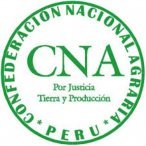English · Español

17 February 2016 | Interviews | Resisting neoliberalism | Human rights | Extractive industries | Climate Justice and Energy | Food Sovereignty
Peruvian campesino people take a stance ahead of national elections in April
Download: MP3 (2.8 Mb)
The National Agrarian Confederation of Peru (CNA, for its acronym in Spanish) points out the priority of its demands on lands, territory, education, health, and culture ahead of the forthcoming national elections, to be held on April 10. CNA also warns that “the Fujimori family” and Alan García can’t be allowed to be in the government again.
In the general elections in Peru, the Andean president, vice presidents, congressmen and parliament members will be elected for the period 2016-2021. In the event that no presidential candidate achieves more than 50% of the votes, a runoff election on June 5th will take place.
In an interview with the journalist Mabel Medina, who is a CNA member and contributor for Real World Radio, the president of this campesino organization member of the Latin American Coordination of Rural Organizations (CLOC - Vía Campesina), Antolín Huáscar, highlighted the legal uncertainty of campesino people over their lands. He also stressed that in the coastal area of the country they are affected by the concentration of lands, and in the forest by the oil industry, among other things.
The leader is especially concerned about the advance of agribusiness and transnational capital over the lands. “Almost 50% of the national territory is occupied by rural, indigenous and coastal communities. (...) From these communities we bring food to the popular markets. But we are in danger, since we are facing a threat of large transnational companies coming to invest, for example in mining, oil, and forests.”
"This issue should be a priority for the central government to come,” said Huáscar, who claimed titles to campesino lands so they can continue with their food production.
Regarding education, the president of the CNA assessed that the Peruvian model “is not ours, we follow European education” and in terms of health “we are practically abandoned.”
Asked by Mabel Medina about what does he expect from the new government to achieve “positive” developments for campesino people, the leader said that there needs to be a political will to open a real dialogue process, in which rural workers have to “do their part” so that “we ensure that campesino families can stay in their communities.”
Huáscar did not spare comments on at least a couple of presidential candidates: Keiko Fujimori, daughter of Alberto Fujimori, who was the president of Peru from 1990 to 2000 and ended up imprisoned for crimes against humanity and corruption; and Alan García, president of this country from 1985 to 1990 and from 2006 to 2011.
The president of the CNA recalled that the Fujimori family “repealed the agrarian reform law, opened the State to the private sector, violated human rights, killed and imprisoned people, sold our strategic companies,” and therefore has a “historic debt” with Peruvians. Meanwhile, he blamed Alan García for the “Baguazo,” as it was called the slaughter in June 2009 of dozens of indigenous people in the province of Bagua, in the northern Amazon region, by soldiers sent by the government. “We can’t allow these people to govern again,” Huáscar lashed out.
Imagen: viacampesina.org







